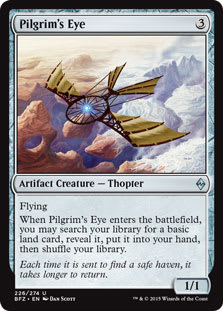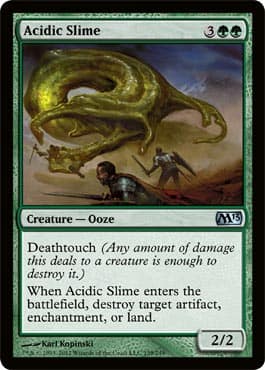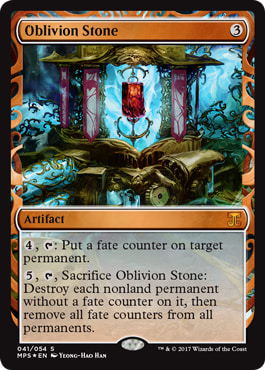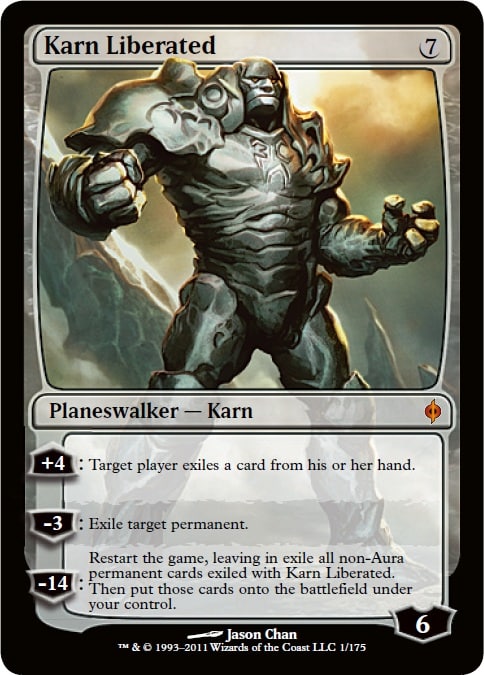I heard this on Twitter last week; it sounded silly to me, so I ran it by my playgroup, and they responded with varying shades of “WTF!?” But how can we argue with the guy who said it when there has never been a shared definition of “politics” in the history of multiplayer Magic? Last night, I was playing a Dimir deck, and I chose to play an Island on turn one instead of a Swamp. Is that political? I don’t think so, but to someone out there, it could be—“politics” means something different to everyone.
I have written about this topic before, but I haven't had much success in shaping the debate. But now!!! Now I will put this contentious bastard baby to bed once and for all, by explaining why it is important, what the difference is between politics and strategy, and how understanding this difference makes you better at both.
Why It Matters
The term politics is used in two different contexts: inside and outside the multiplayer community. Outside the multiplayer community, it is a negative term, as in, “I don’t play multiplayer because it’s all about politics.” I've heard this again and again and again. In fact, here is a quote about multiplayer from one of the biggest names in Magic history; can you guess who said this?
In other words, he, and a lot of other people throughout the Magic world, sees politics as an inescapable part of multiplayer, or even the determining factor. This isn't some random jackoff on Reddit either, this is Aaron Friggin’ Forsythe, the Head Honcho of Wizards R&D, and probably one of the ten most important people in the entire history of Magic.
Axiom 1: Many players don’t enjoy multiplayer because they think it’s all about politics.
(Corollary 1: “Politics” has negative connotations to many players.)
Now, how are you going to respond to people like that if you can't explain what politics is? You can't. As a result, they will never pick up on multiplayer, and they’ll probably bad-mouth multiplayer to new players, which makes it harder to recruit new members to your playgroup. You might even agree with them and start to internalize the meme, “Casual scrubs are bad at Magic,” that is so prevalent in the tourney set—and so harmful to the Casual Tribe. This problem is the first reason we need a shared understanding of what “politics” really is.
The second reason is inside the community. Listening to podcasts, reading articles, or just talking with friends, you will invariably hear people talking about political cards, political plays, and how to use politics in multiplayer. But I've almost never heard anyone define what politics means to them, and everyone uses the word differently, which is confusing as hell. Are Planeswalkers political? Blockers? Deathtouch? Is Pilgrim's Eye actually a political play, or is it just a 1/1 flyer? How can we talk about the game, or learn any lessons, if we don’t understand one of the most common terms in the game?
Axiom 2: You can't have a conversation with someone else if you don’t understand what the words mean.
What Is Politics
Nobody really knows what “politics” means in a multiplayer context, but we can agree on two things, which will serve as a starting point for finding a definition. First, Magic is essentially a strategy game, same as chess, poker, tic tac toe, or any other game that involves interacting with your opponents in pursuit of victory. Second, I’ve never heard people complaining that they lost a tournament because of politics, so whatever politics is, it must be something different from what happens in duels.
Axiom 3: Magic is primarily a strategy game.
Axiom 4: Politics is unique to multiplayer.
(Corollary 2: Politics and strategy cannot be the same thing.)3
The problem is that most people don’t understand the difference between playing Magic in a different strategic environment (e.g. multiplayer) and politics. They assume that everything involving multiple opponents must be political, but this doesn’t make any sense. Strategy is about using your cards in the most effective way to win the game, and that is the same whether you have one opponent or two.
Look at it like this: If your opponent in a duel has two creatures and you have one removal spell, you're usually going to blast the most dangerous creature, right? Assigning priorities to different targets is a fundamental part of strategy: It’s resource optimization. Now consider a comparable situation in multiplayer: If you have two opponents and they're both open, you’re usually going to attack the most dangerous opponent, right? The strategic skill of prioritization is the same.4
The reverse is also true. If I keep my creature back to block, let’s say an Acidic Slime, that is going to stop some of my opponent’s attacks in a duel. This is the simple strategic concept of deterrence. The same is true in multiplayer, except it can deter attacks from all of my opponents, and instead of attacking me, they might attack each other.
This is where a lot of people become confused and say it’s politics, but we are still talking about deterrence, which is equally strategic in duels and multiplayer. The difference is that the effect of deterring an attack can be different. Choosing not to attack into my Slime, and attacking another player instead, is a strategic decision, just like deciding what creatures to attack with or what to target with removal. Having multiple opponents changes your strategic decision-making, but it doesn’t change it into something that is completely different from duels—that is, it doesn’t turn strategy into politics (it just makes the strategy more interesting, which is why we play multiplayer, right?).
Some people think that you are somehow “manipulating” your opponents into attacking someone else when you play a blocker, and that this is therefore political, but manipulate is a loaded term that doesn’t really describe what happens. If I’m playing tic tac toe and I get two Xs in a row, I “manipulate” my opponent into blocking the third square. In chess, if I put your king in check, I “manipulate” you into moving it. That doesn’t mean that those games are political. When your opponents respond to your in-game actions, you are playing a strategy game.
Axiom 5: Strategic decisions will be more complex in multiplayer because it is a more complex strategic environment.
So things like resource optimization, deterrence, understanding what your opponents are thinking, appearing weak when you are strong, and strong when you are weak, are all essential elements of Magic strategy in a duel, and they are transferrable to multiplayer. That tells us a lot about what isn't politics. Cards like Propaganda or No Mercy aren't political, they just change your opponents’ strategic decision-making. It is great if they attack each other instead of you, but they are just trying to use their resources (e.g. mana and creatures) as effectively as possible, just as they do in duels.
We can form a better idea by of what politics is by thinking about how we use the word politics in other situations. There is some parallel between saying, “Multiplayer sucks because it’s all about politics,” and saying, “John only got promoted because of office politics.” In the second example, we would assume that John wasn’t as good at his job as some of his coworkers, but he received the promotion through some kind of personal dealing with his manager. In the same way, the people who use politics negatively to talk about multiplayer probably mean you had a weak deck but you won by making a deal with another opponent.
This idea brings us much closer to a definition—the kind of communication and deal-making that you sometimes see in multiplayer is a unique element, not found in duels. Real politics is a realm of negotiation, bartering, and compromise, and when we talk about politics in multiplayer, we are using it as a metaphor, comparing what happens in the game to what happens in the Washington, D.C. or the United Nations. Outside of an intentional draw at a tournament, that kind of thing is irrelevant in a duel, for obvious reasons. There might be a little bit of banter and trash talk, but next time you’re at Friday Night Magic, try telling your opponent, “You shouldn’t attack me because I have a removal spell.” You'll find that it has no effect whatsoever.
Axiom 6: Table talk of various kinds is the most unique element in multiplayer.
This is the essence of politics in multiplayer. If you play your cards as efficiently as possible, making your own assessments about the threat landscape, you are just playing multiplayer strategically, as most of us do most of the time. If you are also talking about what you’re going to do, what cards you have, who is the best target for someone else’s attack, and so on, you’re entering the realm of politics.
This seems to be the clearest and simplest way to clarify what is politics and what is just regular Magic strategy. I’m not insisting that it’s perfect, or that everyone has to use my definition, but it is the only definition I’ve seen that serves the two main needs of the community: allowing us to explain to detractors why multiplayer is not determined by politics and helping us to speak a common language about the game.
I would just add one thing: It is helpful to distinguish between overt deal-making and negotiation and the more common table talk such as, “Are you sure you want to attack me? His Planeswalker is ready to go ultimate next turn,” which is sometimes necessary just because people might not be paying total attention to the game. The distinction I propose is:
High Politics: the manipulation of hidden information to change your opponents’ behavior.
Low Politics: the selective emphasis of known information to change your opponents’ behavior.5
Hidden information includes all of the things that your opponents would otherwise have to guess at, including what is in your hand, your deck (usually), and most importantly, what your intentions are.
Understanding the Difference
If you want to grow better at multiplayer, understanding the difference between strategy and politics is huge. First, you need to understand that strategy is primary and that politics is an adjunct to that. Your opponents will only go along with your political finagling if they believe it will help them win. If you tell me that you will blow up your Oblivion Stone if I attack you, I will probably attack someone else—unless it is in my best interest to get you to blow the Stone now. If you offer a truce so that we can kill a third player, I might go along with that—unless you are more threatening to me than the other player. If you say that you won’t blow up my stuff with Karn Liberated if I leave you alone, I might leave you alone—unless I'm more scared of you activating Karn’s ultimate and winning the game. When you understand that, you can understand who is open to making a deal with you and what kinds of things they will agree do.
Second, you can use high politics to strengthen your strategy. I wrote about this here, but basically, you can reveal hidden information in order to strengthen deterrence, to get people to do something against their will (called compellence in strategy jargon), or to build a balancing coalition against The Threat.
Third, when you understand the importance of low politics, you can think about which information will be most meaningful to your opponents, and then selectively emphasize that at the right time. Manipulating known information to alter your opponents’ threat perceptions can be a far more powerful lever than just asking someone to trust you that your big scary monster won’t hurt them.
Finally, because strategy is the constant and politics is the variable, you need to pay attention to how your opponents respond to political maneuverings. Some people love to make deals, and some people hate it. Some people might target the would-be politician first just to make the game less complex. I've even met folks who refuse to play with someone who overdoes the political level. Also, there’s nothing to stop other people from making similar kinds of deals, so if you wheel and deal too much, you might inspire an alliance against yourself.
As a general rule, I try not to cross over from low politics into high politics, although I've had fun on both sides of that line.
Conclusion
Politics is the most complex topic in multiplayer, which is why most people prefer not to think about it. But we need to know what we’re talking about and to define things in a way that makes sense both to us and to those outside the multiplayer community. Understanding politics isn't that hard once you understand how the strategic environment shifts in multiplayer, and once you know what politics is really about, you can use it more effectively. At the same time, when you realize that your opponents are beating you with superior strategy rather than politics, it is a learning opportunity. Look through their eyes, understand how they see the game, and try to do the same thing yourself next time.
If you have any questions, please respond in the comments section below (you can sign up easily through Facebook or Twitter). This is an important discussion that we need to have, but please approach it with an open mind. The status quo of vague and contradictory meanings is not an option.
For further reading, here are my various (lengthier!) attempts to clear up the problem in chronological order:
- Graveborn Musings – Politics, Complexity and Multiplayer Strategy (Part I)
- Graveborn Musings – Politics, Complexity and Multiplayer Strategy (Part II)
- Graveborn Musings – Politics, Complexity and Multiplayer Strategy (Finale)
- Gathering Magic – Politics Pop Quiz
- Gathering Magic – Three Things I Know
1 I’m not going to name names, although my Twitter followers will know the whole story (sorry for the spam, guys!). But you need to know that the person who said this is a world-famous member of the Commander community, far more influential than I, and he not only said this, but he defended it at length, and he even wrote a blog post about this idea. This makes it clear that confusion over politics has spread like herpes in a whorehouse.
2 Aaron Forsythe, “Good Beats: Stop Being so Casual.” The Dojo, Sept 2000. Available online at: http://web.archive.org/web/20001017194435/www.thedojo.com/column2/col.000918afo.shtml.
3 I’ve heard a lot of folks say that they think of politics as a subset of strategy, which could be true, but when you consider how a stereotypical political play works (“I promise not to attack you if . . . ”), they really do seem completely different. If everything you do to win falls under the category of strategy, cheating is also part of strategy. I tend to think that strategy and politics are different because you are using different tools to win the game. However, even if you think politics is a subset of strategy, that doesn’t solve the basic problem: You still have to define it in a way that separates political strategy from non-political strategy; otherwise, your definition is useless and we’re back to square one.
4 Yes, I know there are exceptions to these examples. Magic is the most complex game in the known universe, so there are exceptions to every example; it doesn’t disprove the basic point. For example, there might be times when you would attack the weakest player or not attack anyone, just as there might be times to destroy the weaker of your opponent’s creatures, or when you hold the removal spell in your hand for a little while longer.
5 High doesn’t mean noble, and low doesn’t mean underhanded. High politics is a purer form of politics, whereas low politics is mixed in with some of the social aspects of the game, such as a normal conversation about what’s happening. It also works less directly, usually shaping your opponents’ threat perceptions, which in turn affects their behavior.





























